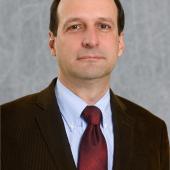
Orlin D. Velev, INVISTA Professor, North Carolina State University will be presenting the Andreas Acrivos Award for Professional Progress in Chemical Engineering Lecture, October 30, 2018.
Andreas Acrivos Award for Professional Progress in Chemical Engineering:
In honor of one of the chemical engineering profession’s most influential leaders and one of the great fluid dynamacists of the 20th century, the American Institute of Chemical Engineers (AIChE) has renamed the Professional Progress Award the Andreas Acrivos Award for Professional Progress in Chemical Engineering.
This award is endowed by the AIChE Foundation thanks to the generous support of the Andreas Acrivos Award for Professional Progress in Chemical Engineering.
See Founding Donors

Refreshments will be served.
Recognizes outstanding progress in the field of chemical engineering. The awardee will have made a significant contribution to the science of chemical engineering through one of the following means:
- A theoretical discovery or development of a new principle in the chemical engineering field.
- Development of a new process or product in the chemical engineering field.
- An invention or development of new equipment in the chemical engineering field.
- Distinguished service rendered to the field or profession of chemical engineering.
Orlin D. Velev, winner of the 2017 Andreas Acrivos Award for Professional Progress in Chemical Engineering and S. Frank and Doris Culberson Distinguished Professor, North Carolina State University will be presenting the Andreas Acrivos Award for Professional Progress in Chemical Engineering Lecture.
Microscale Engineering of Responsive, Flexible and Reconfigurable Particle Structures
Orlin D. Velev, S. Frank and Doris Culberson Distinguished Professor, North Carolina State University
We will discuss the principles of microscale engineering of novel classes of flexible and dynamically reconfigurable assemblies from colloidal particles. Examples of such assemblies include magnetically reconfigurable gel networks, shape-changing microbots, and inks for 3D printing. The key to making such structures is the engineering of directional interactions and of flexible inter-particle bonds. In the first part of the talk, we will discuss how complex magnetic polarization patterns on metallo-dielectric microcubes lead to multidirectional interactions and assembly of reconfigurable microclusters. These sequence-encoded clusters can be reversibly actuated and spatially transported by magnetic fields and can be designed to be self-motile in non-Newtonian media. In the second part of the talk we will describe new types of multiphasic capillary gels from particles bound by liquid bridges. The first gel system is made of filaments from magnetically responsive iron oxide nanoparticles suspended in water-oil systems. The nanocapillary binding results in ultra-high filament flexibility. The second multiphasic system that we introduced is a new class of 3D printing inks consisting of PDMS microbeads, liquid PDMS and water. Owing to the capillary binding, such Homocomposite Thixotropic Pastes (HTPs) can be extruded and shaped on a 3D printer. The curing of the liquid bridges in the HTPs results in remarkably elastic and flexible porous silicone materials, which can be 3D printed under water and find applications such as direct printing of bio-scaffolds.

